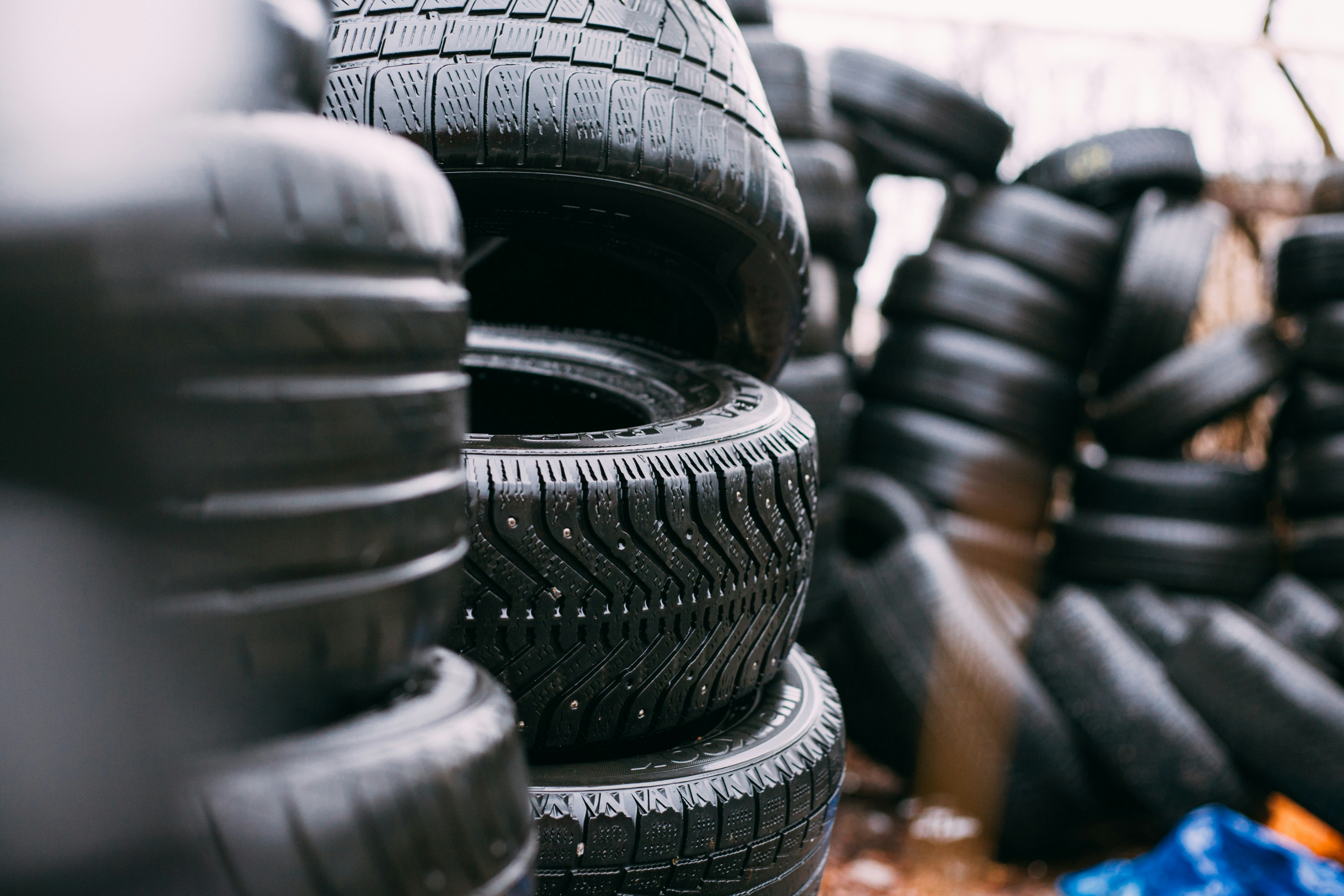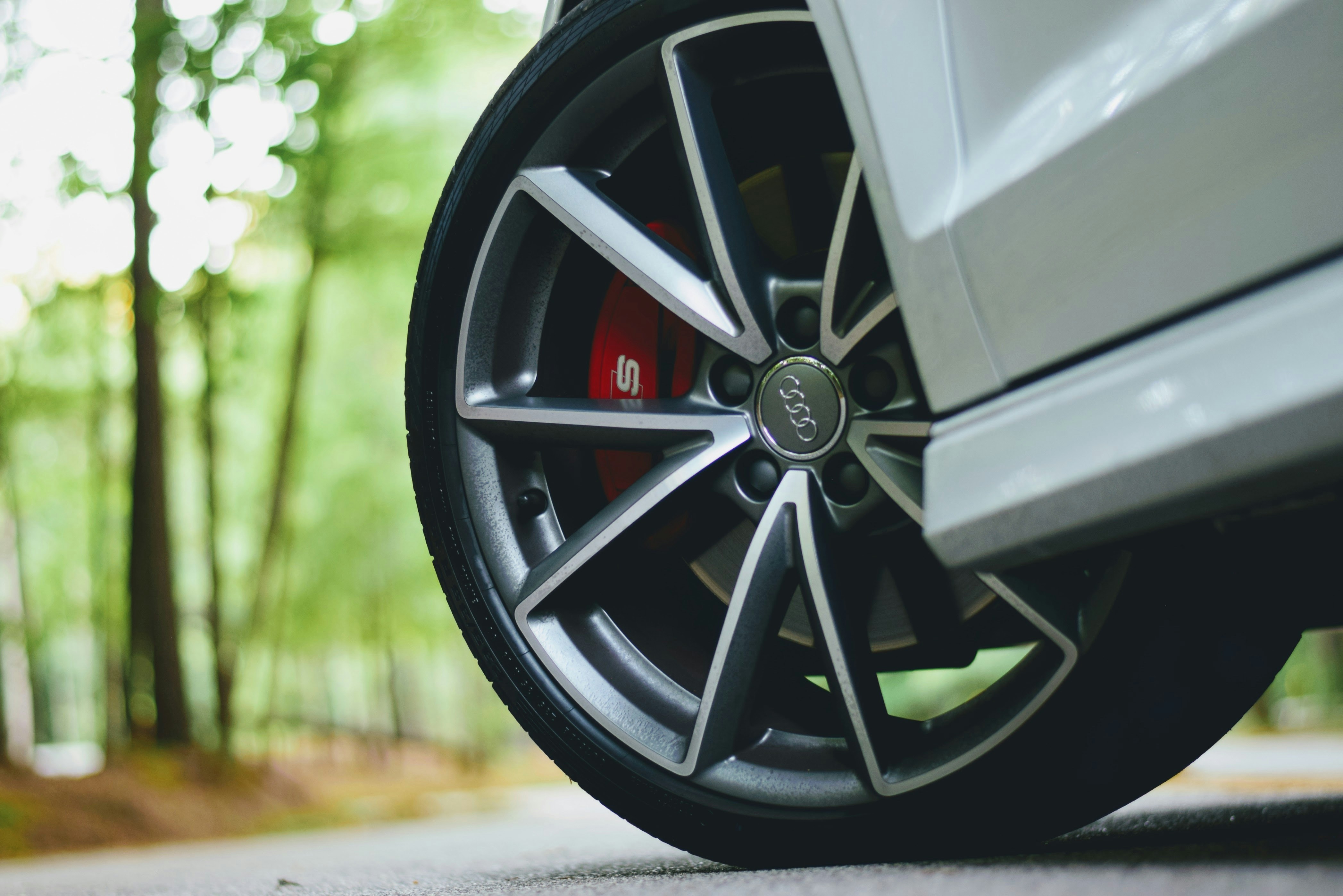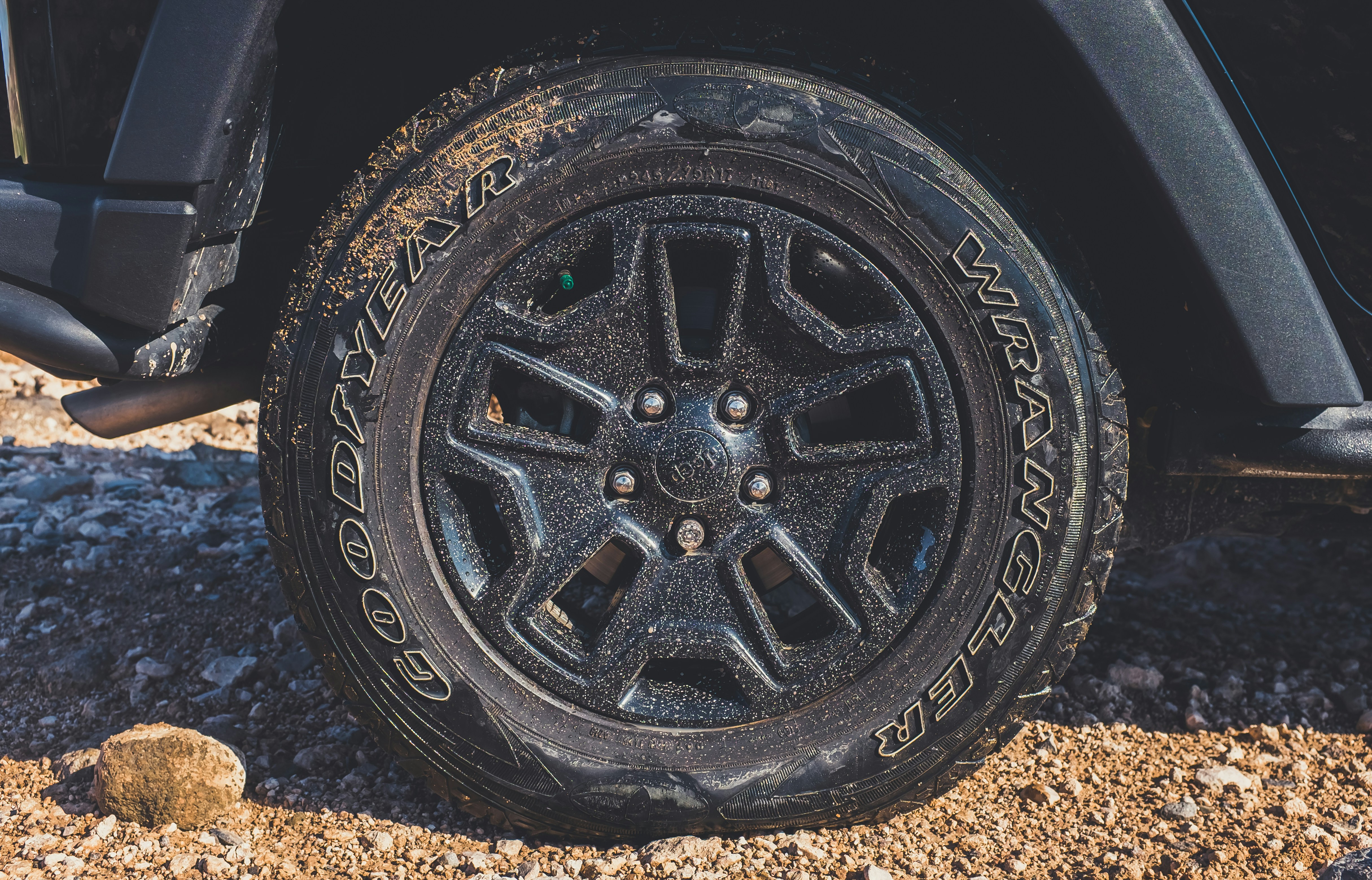Whether you’re just buying your first car or thinking about swapping out the tires on an old favorite, there’s a lot to know about tires.
Your tires can make all the difference in how you handle the road and even whether you make it to your destination without issue. If something goes wrong with a tire, it can mean a tire change or even a breakdown.
In this guide, we’ll look at how tires work and what they’re made of, the most common tire types, essentials of tire maintenance, and the basics to consider when it’s time to shop for new tires.
Ready to become an expert on all things tires?

We spend a lot of time thinking about our cars – picking a car, then gas, parking, maintenance, but tires rarely get as much thought. Let’s take a look at the basics.
Starting from the very beginning, tires are the rubber cushions filled with compressed air that go around the wheels of a vehicle.
Tires are a necessary component of every car, truck, and SUV. The friction created by tire treads is part of the process that allows a vehicle to move forward, so having the right tires and making sure they’re in good shape is important for the proper functioning of your car.
Typically, when you buy a car, it comes with tires and a spare. The cost of these tires is included in the price you pay overall for the car.
If you’re buying a brand new car, it should come with brand new tires that are standard for your vehicle model. You may also be given the option, when buying from a dealership, to upgrade to specialty tires. If you’re buying a used car, it’s likely that you’re getting used tires and buying them as-is.
As you drive your car over the years, your tires can start to wear down. This wearing down can be accelerated by aggressive driving, harsh road conditions, and other factors. Knowing what to look for and when to repair or replace your tires is a key part of long term car maintenance.
Start by getting to know your tires and learning about the different kinds of tires that might be available to you. For example, many people who live in wintry climates change their tires out in the winter for special winter tires, both to preserve the standard tires and improve their vehicle’s road safety in icy and snowy weather.
The treads on the tire are the part of the tire that make contact with the road, and varying treads and tire sizes make for different road capabilities, from helping you move faster to helping you navigate mud and snow.
Broadly, tire types vary in:
Tire size and vehicle fit
Rubber flexibility or durability
Tread shape and tread size
Here are all the primary kinds of tires available, and why you might want them (or not).

All-season tires are the workhorse of the tire world. They’re the tires your vehicle is most likely to come with, unless you’re driving a vehicle specifically designed for off-road driving, like a Jeep Wrangler.
These tend to be relatively affordable and long lasting, and the gold standard for just a standard set of tires.
All-season tires come in different sizes and are available for each vehicle category: car, SUV, and truck.
There are a few different tire types that fall under the high performance (HP) umbrella, but broadly these are tires designed for sports cars and similar luxury vehicles. They have high handling capabilities but are more expensive and tend to need to be replaced more frequently than standard all-season tires. They aren’t generally available for trucks and SUVs, but may fit some sedans.
They are unique for their softer rubber and grippier treads than standard tires.
There are summer, all-season, and winter versions of high performance tires, and they generally offer a happy medium between all-season and ultra high performance (UHP) tires for second vehicles that won’t be in much inclement weather.
Summer high performance tires are not designed for rain or snow and will not be safe in more than a light rain. All-season high performance tires could hypothetically be used on a family vehicle, but would probably create higher annual tire costs. Winter performance tires are designed to be the winter equivalent of HP and UHP tires for vehicles designed for those tire styles and have improved cold weather grip..
These are not tires designed for daily use or people who live in harsh climates, and could become unsafe or need to be replaced several times a year if used incorrectly.
However, for those with a sports car that’s used for recreational purposes and the budget to splurge for a tire to match, they can be a great choice.
Ultra high performance tires, also known as track tires or racing slicks, are tires specifically designed for driving fast under optimal road conditions in upscale sport and racing vehicles. They tend to have the highest speed ratings available, and can usually perform in wet weather, but aren’t designed for snow and ice and require compromise in ride comfort and tire durability.
UHP tires are among the most expensive tire options and need frequent replacement. They aren’t generally a practical choice, even for second vehicles, except under very specific circumstances.
There are no or few true UHP winter tire options, so those that use UHPs and want to take a vehicle out in the winter will need performance winter tires, which have a lower speed rating but better cold weather grip. That said, most people who own the expensive and high maintenance vehicles that go with UHPs probably won’t want to take them out in the snow too often anyway!
On the other end of the spectrum, there are all-terrain tires, which are usually large and designed only to fit SUVs and trucks capable of going off-road.
All-terrain tires are specifically designed to be usable both on pavement and on dirt roads or for light off-roading. They are sort of like the hiking boots of tires – they have bigger, deeper treads designed to work in more road conditions, but aren’t so specialized they can’t work for general use. They would be the standard tire option for someone with a Jeep Wrangler or Ford F-150 or similar vehicles.
All-terrain tires also have enough traction to drive in light snow, and for heavy vehicles can sometimes be sufficient to get you through the winter, but generally aren’t considered sufficient for icy conditions. That means, if you live somewhere that regularly gets very icy or snowy, winter tires may still be necessary, but it’ll depend on your vehicle and region.
Off-road tires are the next step up from all-terrain for those who live most of their lives in areas with dirt roads or are regularly driving off pavement. They are more puncture resistant than standard tires and have large, deep treads ideal for getting through mud, sand, and gravel. That said, they’re not designed to be driven on paved roads or at highway speeds.
They’re a specialty tire only really necessary for people who need to be able to drive on uneven, unpaved terrain more than they drive on pavement.
There are other kinds of specialty tires, usually only used on trucks and off-roading vehicles. The primary others are mud tires and heavy duty tires.
Mud tires are what they sound like – they have wide blocks and treads designed to release any debris and keep you moving in mud and sand conditions. They’re not as good for crawling over rocks and differ from off-road tires in the way they squeeze and release any mud stuck in the treads.
Heavy duty tires are tires that can take more weight than other tires for those that plan to haul trailers or max out their truck’s payload. Heavy duty tires are unique among specialty truck tires in that they’re generally good for daily driving and highway driving and tend to offer good durability and longevity.
Winter tires, sometimes called snow tires, are tires around the level and style of all-season tires, except that they’re specifically designed to make it easier and safer to drive in icy, snowy, and very cold conditions.
There are winter tires for every size and vehicle style, car, SUV and truck. What makes winter tires unique is that they have better grip in inclement weather and are made with a specially formulated rubber that stays pliable below freezing. Because of these factors, winter tires aren’t as good in warm weather on clear roads, and should be changed in and out seasonally.
Anyone who lives somewhere that typically has below freezing temperatures all winter long should seriously consider having winter tires for the cold season.
Most people are paying more than they need to on their monthly car payment.
If you’re one of them, Auto Approve can help you save money and lower your payments by helping you find the best available deal for you.
Find out if you’re eligible for a better rate with a free, no-commitment quote. All it takes is a few minutes of your time. If you find a better rate, we handle the paperwork, with no markup.

Now that you know about the types of tires, how do you keep them in good condition?
Here are the key steps you can take to keep your tires in good condition.
Maintain air pressure.
Get your tires rotated.
Don’t use the wrong tires for your driving needs.
Repair minor punctures and penetrations, and replace when necessary.
There are two key things to think about to help you decide if you need to replace your tires.
The first is general wear. As you use your tires, the treads will wear down. As the treads erode, the tires become less effective. Too little tread and your tire may eventually have trouble gripping the road, which makes it harder to control the vehicle.
At a certain point of wear, the tires are no longer safe and need to be replaced. AAA recommends replacing tires when the treads hit 1/8th of an inch, because braking distances will start increasing at that thickness.
The second is the tire’s ability to hold air. If a tire has been punctured or penetrated, you may be able to use a repair kit to temporarily patch minor issues, but ultimately, you’ll likely need to replace at least that one tire.
If your tires are relatively new, you may be able to get away with replacing just one tire (rule of thumb is if the treads are still 30% or less worn down). If your tires are more worn but you want to save money, you can sometimes get away with replacing two tires and leaving the other pair until they’re worn down enough that you have to replace them (especially if you use two-wheel drive).
Most tire experts, however, recommend replacing all 4 tires any time you need to replace one, to ensure even wear and avoid problems down the line.
Other things to look out for include:
Tire sidewall cracks
Uneven wear (which could indicate an alignment issue)
Shaking, vibrations, or bumpy sensations
Bulges and bubbles in the tire rubber
When it’s time to buy new tires, here are a few things to look at and consider.
First, you’ll need to make sure any tires you consider will fit your vehicle. Most tire sellers will ask for your vehicle’s exact make and model.
From there you’ll want to consider:
What type of tire you want and for what purpose (thinking about the types of tires referenced earlier in this guide)
Speed rating (the letter grade given to indicate the maximum speed at which the tire will function optimally over time)
Load index and range (the tire’s carrying capacity, if there’s a change you’ll want to transport heavy loads – especially relevant for truck owners)
Mileage warranty – any tire purchase you make should come with an expected mileage before they’ll need replacement, and some tire sellers will sell tires at different price points based on this number
Price point – specialty tires may cost more or need more frequent replacement, so make sure you have the full picture and are happy with the price before making any tire purchases
There are many reputable tire makers and sellers, but you may also want to consider buying from stores that will also cover maintenance and that you’re happy having a long term relationship with.
Has this changed your mind about what type of tire you want or need for your vehicle? Are your tires in good condition? You’re now set with tons of information to keep your wheels rolling for years to come. What you choose to do with it is up to you.
Tire changes can be expensive. If you’d like more money in your pocket – for any reason – why not lower your car payment with Auto Approve?
Auto Approve makes refinancing your vehicle simple. And, because dealerships mark up their rates, there are many people right now who qualify for a better rate and a lower monthly payment.